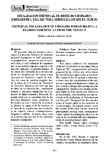Mostrar el registro sencillo del ítem
Declaración universal de derechos humanos emergentes, una lectura orientada desde el sujeto
| dc.rights.license | http://creativecommons.org/licenses/by-nc-sa/3.0/ve/ | es_VE |
| dc.contributor.author | Calderón Díaz, Sheila Cristina | |
| dc.date.accessioned | 2018-06-21T06:00:54Z | |
| dc.date.available | 2018-06-21T06:00:54Z | |
| dc.date.issued | 2017 | |
| dc.identifier.issn | 1690-3544 | |
| dc.identifier.uri | http://www.saber.ula.ve/handle/123456789/45046 | |
| dc.description.abstract | El presente artículo aborda el documento Declaración Universal de derechos humanos emergentes de 2007, instrumento programático propuesto por la sociedad civil, el cual evidencia las temáticas que se encuentran vigentes respecto a los derechos humanos en nuestro tiempo. Se da cuenta del contenido de la declaración desde la consideración del sujeto como concepto no limitado a sujeto de derecho, así como de cambios surgidos desde la firma de la Declaración Universal de Derechos Humanos en 1948 que han incidido en su formulación, atendiendo además a conceptos implicados en la filosofía de Hinkelammert y Foucault. Tomando parte por la consideración de los derechos humanos como conquistas de las luchas sociales a través de la historia, se plantea la vigencia de la temática en el contexto de la globalización sirviéndose de algunos eventos contemporáneos, dirigidos a señalar al sujeto como actor en la realización efectiva de los derechos humanos emergentes. | es_VE |
| dc.language.iso | es | es_VE |
| dc.rights | info:eu-repo/semantics/openAccess | es_VE |
| dc.subject | derechos humanos | es_VE |
| dc.subject | derechos emergentes | es_VE |
| dc.subject | ética | es_VE |
| dc.subject | sujeto viviente | es_VE |
| dc.subject | relaciones de poder | es_VE |
| dc.title | Declaración universal de derechos humanos emergentes, una lectura orientada desde el sujeto | es_VE |
| dc.title.alternative | Universal declaration of emerging human rights, a reading oriented as from the subject | es_VE |
| dc.type | info:eu-repo/semantics/article | es_VE |
| dcterms.dateAccepted | 02/12/2017 | |
| dcterms.dateSubmitted | 28/11/2017 | |
| dc.description.abstract1 | This article addresses the document Universal Declaration of emerging Human Rights of 2007, a programmatic instrument proposed by the civil society, which shows the current human rights issues in our time. The content of the declaration is taken into account since the consideration of the subject as a concept not limited to a subject of law, as well as changes that arising since the signing of the Universal Declaration of Human Rights in 1948, which have influenced its formulation, also attending concepts involved in the philosophy of Hinkelammert and Foucault. Taking part for the consideration of human rights as the conquests of social struggles throughout history, raises the validity of the subject in the context of globalization serving some contemporary events, aimed at pointing the subject as an actor in the realization effective implementation of emerging human rights. | es_VE |
| dc.description.colacion | 299-309 | es_VE |
| dc.description.email | shecadz84@gmail.com | es_VE |
| dc.description.frecuencia | Anual | |
| dc.identifier.depositolegal | 2002TA1412 | |
| dc.publisher.pais | Venezuela | es_VE |
| dc.subject.facultad | Núcleo Táchira (NUTULA) | es_VE |
| dc.subject.institucion | Universidad de Los Andes | es_VE |
| dc.subject.keywords | human rights | es_VE |
| dc.subject.keywords | emerging rights | es_VE |
| dc.subject.keywords | ethics | es_VE |
| dc.subject.keywords | living subject | es_VE |
| dc.subject.keywords | power relations | es_VE |
| dc.subject.seccion | Heurística: Artículos | es_VE |
| dc.subject.thematiccategory | Ciencias Económicas y Sociales | es_VE |
| dc.subject.tipo | Revistas | es_VE |
| dc.subject.unidadinv | Grupo de Investigación de Historia de la Educación y Representaciones (HEDURE) | es_VE |
| dc.type.media | Texto | es_VE |
Ficheros en el ítem
Este ítem aparece en la(s) siguiente(s) colección(ones)
-
Heurística - Número 020
enero - diciembre 2017


